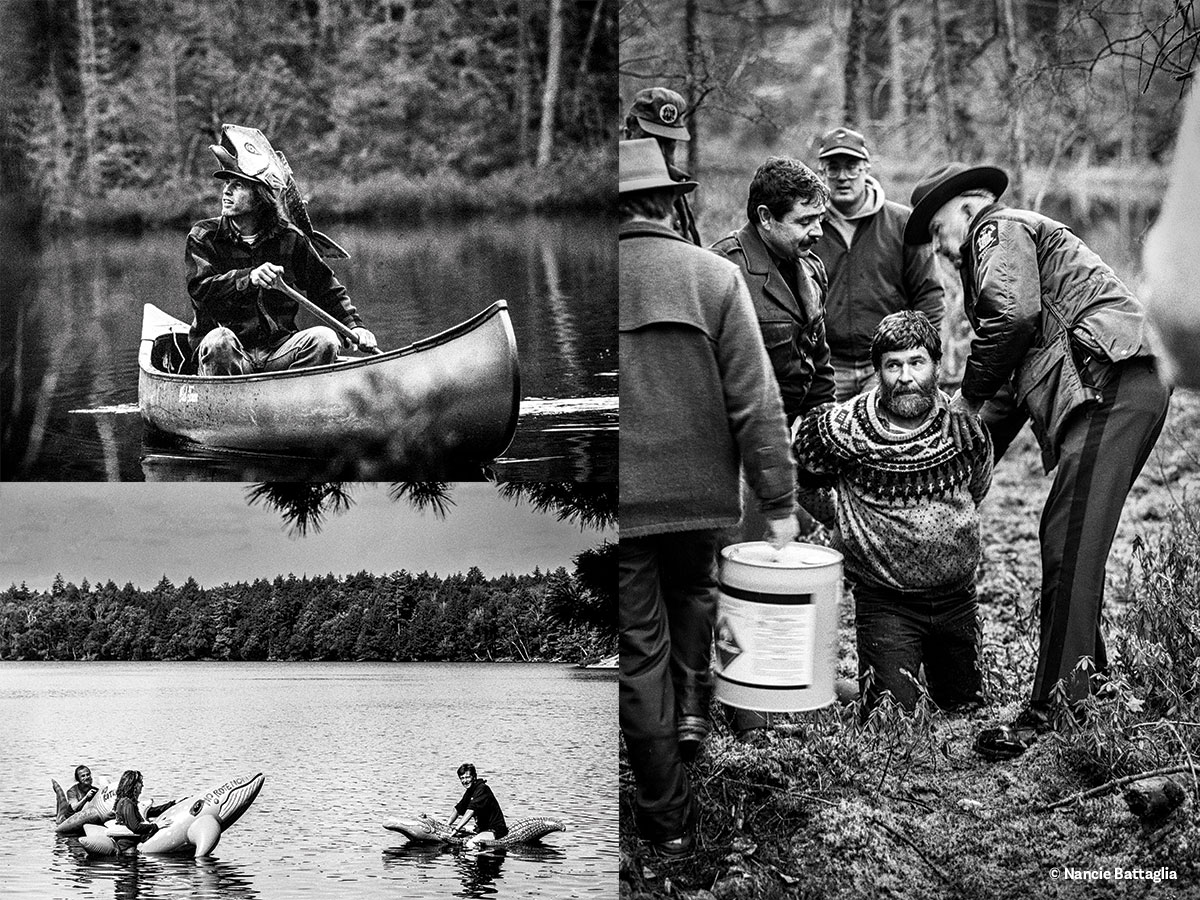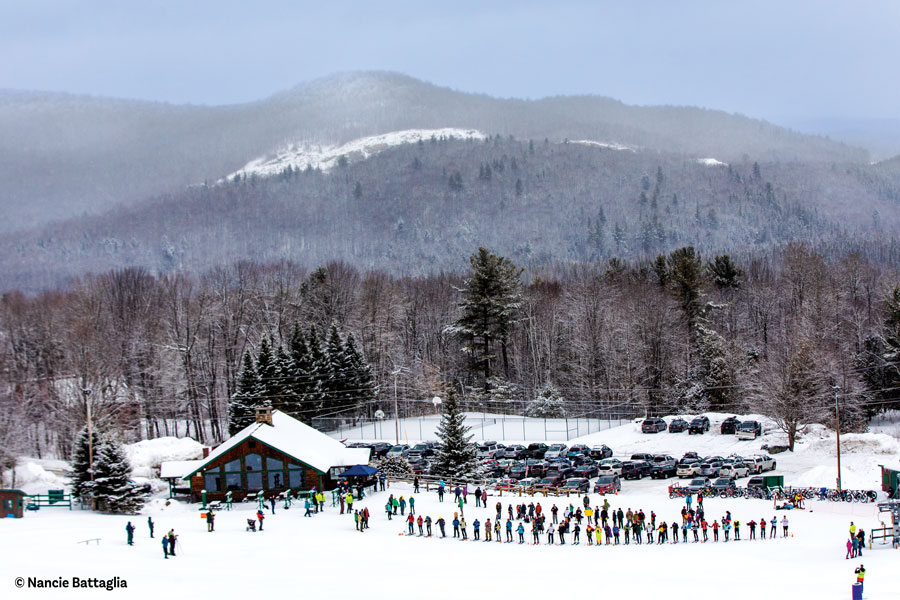Photograph by Ben Stechschulte
For Nichole Gerding, proprietress of Thankful Sage Farm School, in Willsboro, seasonal planning guides her way of life. From household to homeschooling, work and recreation, Gerding brings 18th- and 19th-century practices and sensibilities into the 21st century. She slows things down and makes space for cyclical routines that inform the lives of her family, her clients and customers, her community and herself. She is driven to capture memory and pass it on, often grounding it in the olfactory sense. Gerding works to “normalize heritage skills” of early America and bring them back into common use.
Eleven years ago Gerding founded Thankful Sage Farm School at her kitchen table in Pennsylvania, making soaps and candles using traditional methods, materials and tools (“old good things,” as she describes them). Today her handcrafted products can be found in more than 400 stores worldwide and she teaches heritage skills workshops to community groups, museum educators, historical reenactors and individuals, both in person and online. From cultivating sourdough starter and baking bread to collecting and pressing homegrown apples, growing and processing textiles such as flax, creating natural dyes from plants, blacksmithing, formulating folk medicines, and fabricating traditional scented candles and soaps, Gerding puts time out of joint. She is a historical anachronism perfectly fitted to the rapid rise in people’s interest in being self-sufficient and learning new (“old”) skills. Her own online retail/wholesale store includes products, journal postings, class offerings, and an expanding educational video series called Folklyfe. Gerding’s values and habits do not translate to a simple life-—her lifestyle is as complicated and challenging (and plugged in) as any. Thankful Sage relies and thrives on social media marketing and online participation, bringing yesterday into the present.
Not surprisingly, you can sometimes find Gerding teaching classes and training heritage educators in full colonial costume. Having grown up on mock battlefields, consumed by the smell of woodsmoke, campfire baking, and gunpowder, and interacting with people in period costume (her father is a traditional blacksmith and historical reenactor), Gerding was influenced from a young age to learn the skills, sensibilities and tasks of an early American woman. As an adult, after spending significant time exploring and working in the colonial town of Williamsburg, Virginia, she developed an interest in historic foodways and became an 18th-century food historian and domestic skills interpreter. Sourdough bread baking, for example, involves her 12-year-old starter (lovingly named “Satchel”) in a multi-step, two-day process of feeding, mixing, kneading, proofing, scoring and baking—performed weekly. She also recommends sourdough starter as a replacement in any recipe calling for the leavening agents of baking soda and baking powder.
Her candle making includes molded candles, using tin molds from the 18th century that Gerding rescued from antique fairs and shops and restored with her blacksmithing skills, along with beeswax dip tapers, hand-poured votives and acorn-cap candles. She collects acorn caps off the forest floor and pays local children five dollars per pound to augment her supply. She then sets the caps in rice as she carefully places the wick and fills them with beeswax from her own bees and other local hives.
For soap making she admits that, while she does have an old lye hopper for demonstration purposes, she relies on more modern methods of preparation—paired with early recipes—for safety’s sake.
In 2020 she and her family moved to Willsboro as the pandemic set in. They purchased a three-season home in November, sight unseen, making their first winter extremely difficult, cold and isolating. But the time was also prosperous for Thankful Sage Farm School. “Wildly, I did pretty well during the pandemic,” said Gerding. “Retail shops, mostly online shops, were thriving, and orders were constant and consistent. Most of this rise was happening while I was busy making tapers, nursing a baby, and posting on social media. The candle side of the business doubled and I sold over 3,000 bars of my Dirt Soap in 2021 alone. This was so helpful for our family, as this became our only income.”
Gerding even found herself transformed into the 19th-century equivalent of the Butterball Turkey Talk-line: “I would get messaged on every outlet—YouTube, email, voicemail, text—about sourdough, folks wanting to know proper baking temps and asking flour questions. We were also busy filming classes for small museums and institutions.” She said that “despite the fears and seclusion of that time, we were spinning and never really alone. It remains a special time for me. When fear was king, so many people found hope and fulfillment in the products I offered and the skills I could teach them. I am never not rewarded for my hard work, no matter how small or large my task.”
Thankful Sage Farm School is named for her eldest daughter, Thankful Sage, who in turn is the namesake of one of Gerding’s North Country ancestors, Thankful Sage Robinson. She was mother to Lewis Sage Robinson, who built the historic 1836 Robinson Tavern on the Military Turnpike that runs north of Plattsburgh—once also called Monroe Highway, in honor of President Monroe’s 1817 trip to Plattsburgh. Gerding and her parents made regular summertime visits to the Adirondacks throughout her childhood. She said she is tied to this place, feeling a strong ancestral pull toward settling, working and raising her family in the North Country.
Over the next five years she expects the footprint of her Willsboro farm to grow in tandem with her business. Currently she farms just one acre, but it is bursting with production. In addition to an extensive lavender patch, she grows tea herbs such as calendula, bergamot, comfrey, chamomile, sage and several types of mint. Her dye garden includes indigo, woad, weld, amaranth, madder and French marigolds. And a small fruit orchard is germinating, starting with elderberry and blueberry bushes.
Next year she plans to extend the farmed land to five acres. She wants to add heirloom New England apple tree varietals and flax, which will be used in her education series, as well as raise livestock as grass cutters. Her continued focus on growing herbs for teas and folk medicine and increasing capacity to cultivate and process plant-based textiles will be paired with an apiary to support beeswax and honey. Gerding also wants to grow her production team, hire and train heritage skills educators and farmhands, and offer more hands-on classes in the Adirondacks and around the country—using her farm as an experiential classroom to augment her virtual and in-person workshops. She said that Thankful Sage Farm School will come home once a portion of her Willsboro land is designated for live demonstrations and classes. In the meantime, winter remains a time of travel for Gerding. While her farm is largely dormant, she stays busy teaching traditional arts.
In addition to online outlets, Thankful Sage Farm School products are sold at Whitcomb’s, a community space in Whallonsburg near the Whallonsburg Grange. Once a garage that sold cars, auto parts and snacks to local residents, Whitcomb’s now offers artist studios and workshops, a public meeting room and a retail store filled with locally designed, forged, molded, fabricated and dried products—from flowers to ironwork, woodcraft, textiles, prints, candles, soaps, jewelry and more. Teddi Rogers, the store’s curator and owner of Kit+Syl Studio, said there are customers who smell every one of Gerding’s bars of soap and candles during their visits, with locals returning to stock up on Dirt and Black Tea scents and tourists most often choosing Woodsmoke—perhaps in an effort to take the Adirondacks with them when they leave.
Gerding said she was “put here to teach people about things they forgot,” to resurrect collective memory one individual at a time. By slowing down, focusing on her work as a traditional artist and living a life infused with centuries-old knowledge and practices, she reminds us that time is refreshing. We can wash ourselves in woodsmoke. And stop and smell the dirt.
See www.thankfulsagefarmschool.com for products, journal entries and educational videos—including a primer on making sourdough bread—or follow happenings at the farm on Facebook and Instagram. Find Whitcomb’s (518-412-2056) at 1598 Route 22, in Whallonsburg.
























